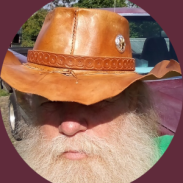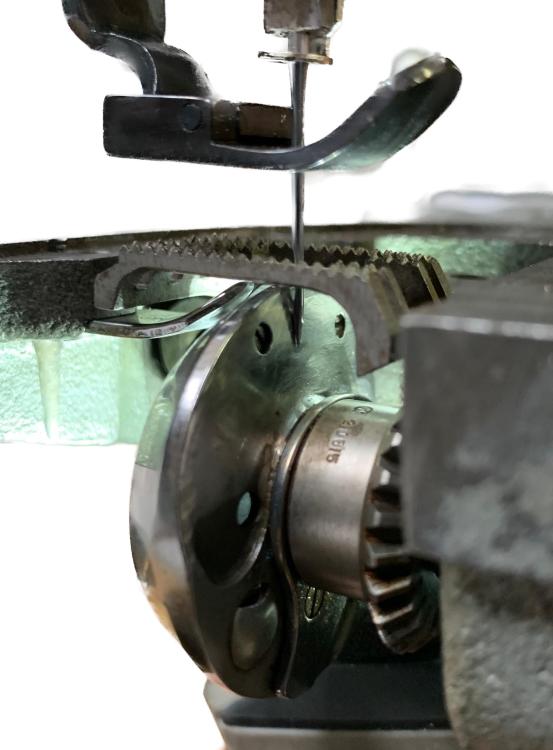
Tejas
Members-
Posts
235 -
Joined
-
Last visited
Profile Information
-
Gender
Male
-
Location
Texas
-
Interests
DIY Marine Canvas and Sail Repair
Recent Profile Visitors
14,420 profile views
Tejas's Achievements

Member (2/4)
-
JodiG, sent you a PM.
-
I have a pdf copy, 22.3 MB. Briefly opened it, and it seems complete. TM 10-3530-202-10.pdf EDIT: Uploaded file 10.7MB
-
Global makes what seems to be a Bernina 217 clone with a cam reader. The video in the link below shows the machine sewing multipoint zig-zag stitches. https://globalsew.com/product/zz-217-series/ Here is a link to the zz-217 Service Manual that shows a picture of one of the cams, that might be compatible. Perhaps you might try contacting Glogalsew. https://globalsew.com/wp-content/uploads/2017/01/service-manual-Global-217.pdf
-
Machine for part time sail repair business
Tejas replied to Jeff96's topic in Leather Sewing Machines
Don't know the price, but spec-wise a Global 217 ZZ-3S might be satisfactory. I had a Bernina 217 with a cam-reader and a four-point three-step zig-zag cam that was quite wonderful. https://globalsew.com/product/zz-217-series/ -
Juki 1508N compound walking-foot industrial sewing machine and table with Family Sew servo-motor, under-arm LED light, goose-neck LED light, drop-down roller edge-guide, custom swing-away binder, thread-stand and several sewing machine feet. One owner, lightly used primarily for sailboat canvas and sail-repair on owners’ sailboat, and for bags and leather. $2500, local Austin pick-up only. More details in Craigslist posting: https://austin.craigslist.org/for/d/austin-juki-1508n-industrial-sewing/7628102862.html
-
Instead of Kevlar thread, you could use PTFE thread which is heat resistant to about 500° F. As for locking the stitches, At the end of the run, leave several inches of thread. Tug the thread on the under-side and pull the top-thread through. Tie off the two threads with a sheet bend or surgeon's knot. A square knot can be used, but a sheet bend or a surgeon's knot is more secure. PTFE thread is quite slippery. A more secure method would be to leave even longer threads but do not pull through. Thread a needle on each and sew several stitches back through the same holes in the seam, essentially the same as a manual saddle-stitch.
-
Help with old Singer cylinder arm machine
Tejas replied to Metalhorseman's topic in Leather Sewing Machines
-
I had a Bernina 217 with a cam reader that I wish I'd kept. The original cams were steel, but I found an after-market for some kind of plastic-like cams that worked quite well . Most of the cams are decorative-stitch cams, but there are two cams you might be interested in -- a three-point two-stitch zig-zag and a four-point three-stitch zig-zag. Both are used for sail making. I'll try to find and post a link to the vender later. I had a few manuals that went with the machine -- Adjustment Manual, Instruction Book, Owner's Book, and Parts Book. I had scanned the books and if you're interested, send me a PM with your email address and I'll send you copies.
-
You might try a Surgeon's Knot, which is similar to a square knot and provides extra friction.
-
Cleaning the garage. Anyone want Big Boy cast iron stand and lasts, sizes 215, 217, 218? They are rusty. See some for sale on eBay, but I don't want anything for them.
-
I mounted a paper towel holder on the right-front underside of the sewing table to feed binder tape to my Juki. Handles large drum rolls and I've had no problem with it getting in the way
-
Mike01230 provides a link for open- and closed-end types of zippers. The choice it seems to me often depends upon the application. Sailright describes these kinds of zippers as finished zippers and continuous zippers. Most of your our applications are different than typical Sailright applications, but the principles are similar, and Sailright has some videos you might want to view. https://www.sailrite.com/Zipper-All-Questions-Answered-about-Zippers-Streaming-Video
-
Here is a link to a manual. Large file (about 15 mb), all text in several languages. https://www.duerkopp-adler.com/commons/download/download-text-attachments/Vintage_Manuals_Adler/Manual_Adler_104_105.pdf Manual_Adler_104_105.pdf
-
I've sewed with both and much prefer the Juki. The Juki is a more modern machine and is still made in Japan. That model Consew was made in China, but the quality of the Consew I used seemed OK. A big difference for me was the difference between a top-load and a bottom-load bobbin machine. I've been writing an industrial sewing machine self-tutorial, and copied below is that section. Top-load versus Bottom-load Bobbin Machine Vertical Axis (aka: top-load or drop-in) bobbin machines are more likely to jam than Horizontal Axis (aka: bottom-load) bobbin machines. Sewers seem to prefer the type of machine they learned on. Advantages and disadvantages of top-load versus bottom-load seem to be: Top-load: Advantages Can see how much thread is left on the bobbin without removing the bobbin Can see and change bobbin without tilting back machine Disadvantages: Must hold thread when stating sewing to avoid jams Must remove fabric to change bobbin Bottom-load: Advantages: More tolerant to lack of holding thread when starting sewing, which means that bobbin-wrap jams are less likely Can change bobbin and resume sewing without removing fabric, especially useful when binding Disadvantages: Cannot easily see how much thread is left on the bobbin Must learn to load bobbin by feel or tilt machine back to see and load Other: Uses a bobbin case, which might be an advantage if bobbin tension is changed frequently and have separate bobbin cases set for different tensions. Apologies for the formatting. Copy and past didn't work very well.




